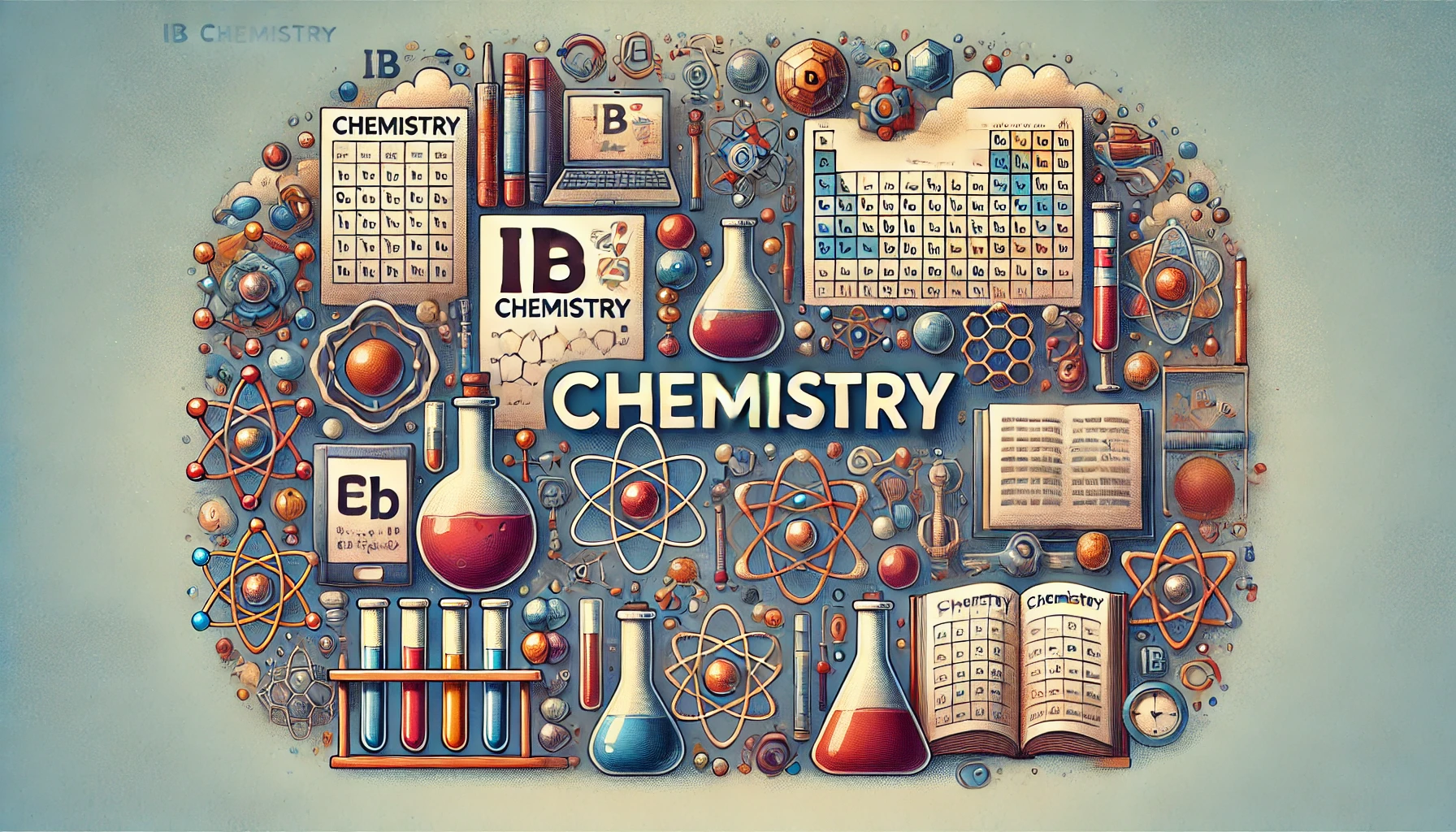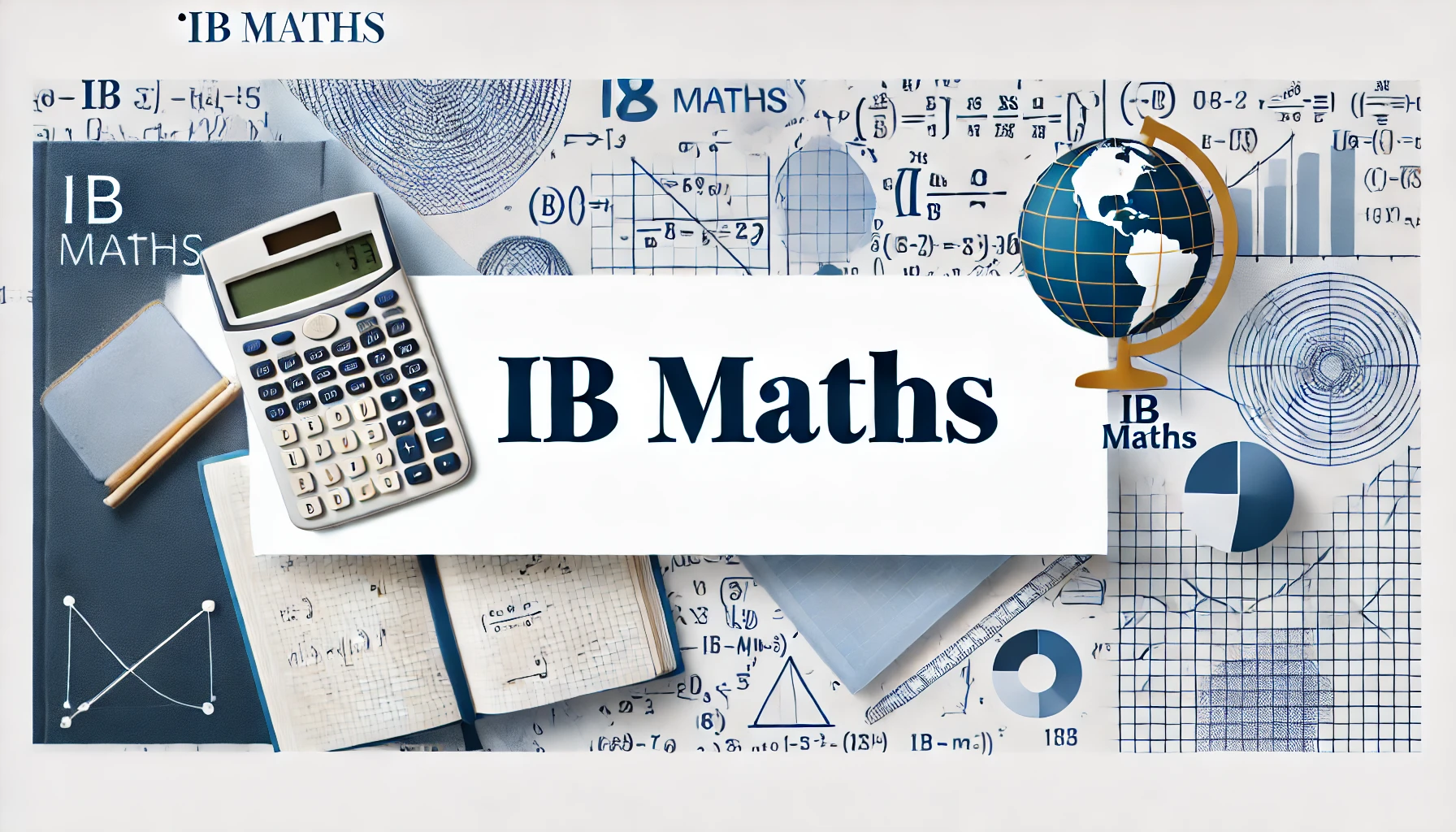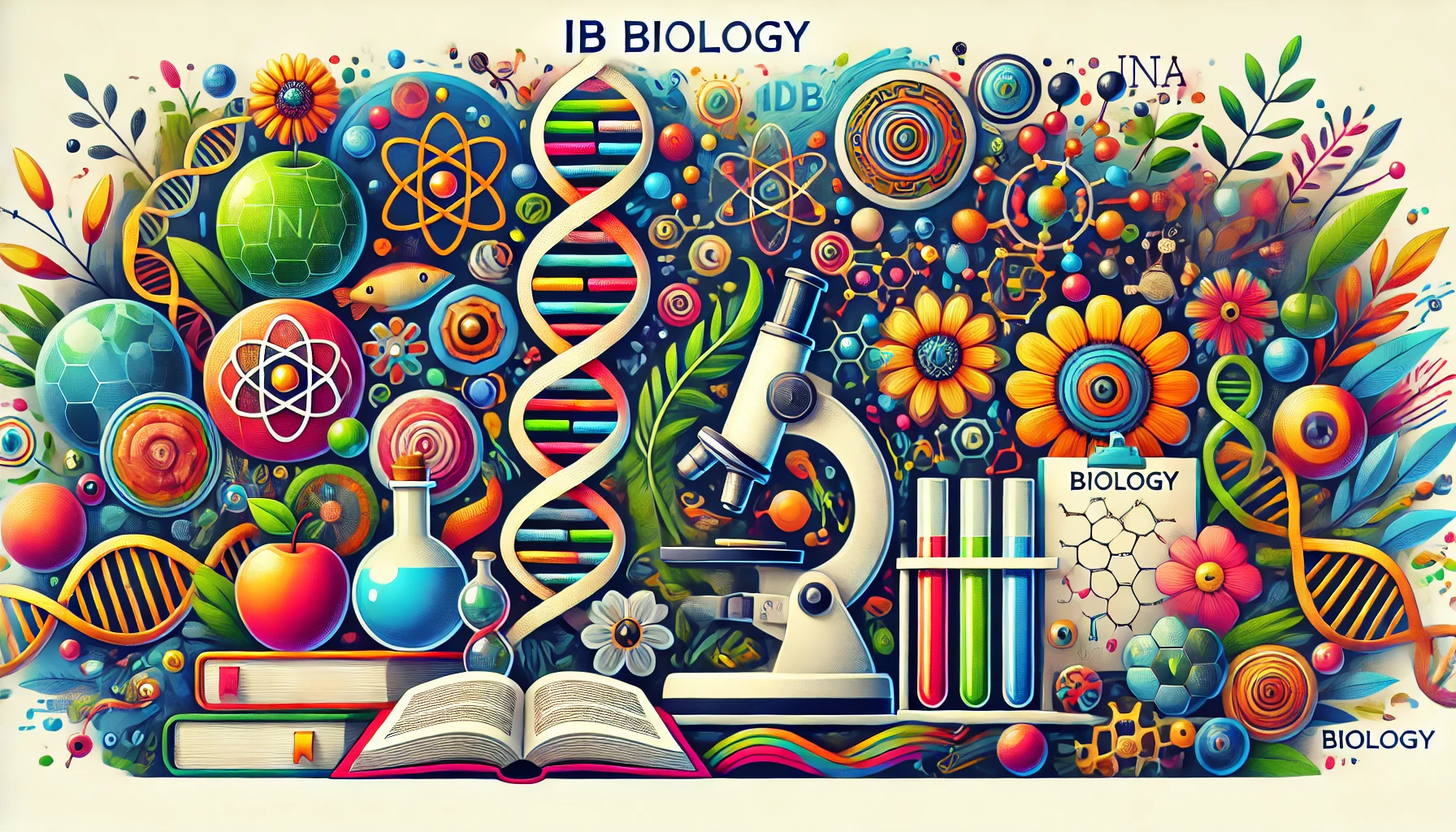

The International Baccalaureate (IB) Chemistry course is an exciting and challenging journey that pushes students to explore the nature of matter, develop analytical skills, and understand the scientific principles governing the material world. Whether you’re aiming for a future in science, medicine, engineering, or simply want to deepen your understanding of how the world works, IB Chemistry offers valuable insights and skills.
The IB Chemistry course can be completed at two levels: Standard Level (SL) and Higher Level (HL). Both levels emphasise hands-on experiments, real-world applications, and conceptual understanding, though HL goes further in depth and breadth.
In this blog, we’ll take a deep dive into each component of the IB Chemistry syllabus:
Structure of the IB Chemistry Course
The IB Chemistry course is structured to develop both theoretical understanding and practical skills, equipping students to analyse and engage with scientific questions critically and independently. The course consists of two levels: Standard Level (SL) and Higher Level (HL). While both levels share core content, students at HL study additional material in greater depth, providing a more extensive foundation for those aiming to pursue science-related fields.
Key Components of the Course
What topics are covered in IB Chemistry?
The IB Chemistry syllabus is carefully structured to guide students through foundational and advanced chemistry concepts, aligning with two main themes: Structure and Reactivity. These themes support a cohesive understanding of how matter is constructed and how it behaves under various conditions, emphasising the interconnected nature of chemistry topics.
- Structure topics introduce students to the atomic and molecular makeup of matter, progressing from the basic understanding of particles to complex chemical bonding and the classification of elements and compounds.
- Reactivity topics build on this foundation, exploring the forces and principles that drive chemical reactions. Students study concepts of energetics, reaction rates, equilibrium, and specific types of reactions like acid-base and redox reactions.
The course also emphasises both theoretical understanding and practical application, with a focus on experimental skills and real-world chemical issues. This layout ensures that students gradually expand their knowledge from basic principles to intricate, real-world chemical processes.
What skills and techniques are you getting assessed on during IB Chemistry?
Throughout the IB Chemistry course, students develop a range of skills and techniques designed to enhance both their theoretical understanding and practical application of chemistry. These skills are embedded within the syllabus topics, allowing students to build competencies essential for scientific inquiry, data analysis, and experimental accuracy.
Here’s an overview of the primary skills and techniques that IB Chemistry students are expected to master:
1. Experimental Techniques
- Safety and Ethics: Students learn to recognise and address safety, ethical, and environmental considerations in the lab. This includes handling chemicals responsibly, using protective equipment, and considering the broader impact of their experiments.
- Measurement Accuracy: The course emphasises accurate measurements of variables such as mass, volume, temperature, pH, and time. Students develop precision through repeated measurements and understanding of instrument limitations.
- Laboratory Skills: Skills such as preparing solutions, performing titrations, chromatography, distillation, and separating mixtures are essential. Mastery of these techniques prepares students for complex experimental procedures in both academic and professional settings.
2. Data Collection and Processing
- Using Technology: Students are taught to use digital tools for data collection, including sensors, databases, and simulations. This not only enhances the accuracy of their findings but also familiarises them with real-world scientific methodologies.
- Data Processing: Spreadsheet software and graphing tools are integral for organising, analysing, and visually representing data. By processing data into graphs, tables, and charts, students develop a clear, systematic approach to interpreting experimental outcomes.
3. Mathematics in Chemistry
- Calculations and Quantitative Analysis: Students use basic arithmetic, algebra, and logarithmic functions for chemical calculations, such as determining molar masses, concentrations, and reaction yields. These mathematical skills support accuracy and reinforce quantitative understanding.
- Uncertainty and Error Analysis: Students learn to calculate percentage error and uncertainty, distinguishing between random and systematic errors. This helps them evaluate the reliability of their results and refine their experimental approaches.
4. Graphing and Interpretation
- Graph Construction: Graphing data is central to interpreting results in chemistry. Students learn to plot data, interpret gradients and intercepts, identify trends, and use error bars for uncertainty.
- Graph Interpretation: Skills include analysing the significance of graph features, such as peaks, slopes, and plateaus, to draw meaningful conclusions. This is especially useful in reaction rate studies and energy diagrams.
5. Research Skills
- Literature Review: Students are encouraged to review scientific literature to support their investigations. They learn how to evaluate sources for credibility, relevance, and reliability.
- Hypothesis Formulation: Developing a hypothesis based on research questions is a key skill. This includes designing valid methodologies, identifying control variables, and anticipating potential errors.
6. Experimental Design and Inquiry
- Planning Investigations: Students are trained to design and conduct investigations with a clear purpose, selecting appropriate methods and controls. This includes piloting methodologies and refining procedures for accuracy and consistency.
- Control of Variables: Through carefully controlled experiments, students learn to isolate variables to determine causal relationships. This skill is essential for obtaining valid, reproducible results.
7. Communication and Collaboration
- Scientific Reporting: Communicating findings through structured lab reports and presentations is a core skill. Students learn to present data clearly and concisely, using chemical terminology and notation correctly.
- Collaborative Work: The IB Chemistry course encourages teamwork, especially in the Collaborative Sciences Project, where students work across disciplines. Effective collaboration helps them appreciate diverse perspectives and enhances their problem-solving abilities.
8. Evaluation and Reflection
- Critical Evaluation of Results: Students assess the validity and reliability of their data by identifying sources of error and considering improvements. This reflective process is essential for honing scientific judgement and critical thinking.
- Ethical Considerations: Throughout the course, students are encouraged to think about the ethical implications of their work, including academic integrity, environmental responsibility, and the broader impact of scientific findings on society.

Internal Assessment for IB Chemistry
The IB Chemistry Internal Assessment (IA), called the scientific investigation, allows students to conduct an independent research project to explore a specific research question. This component makes up 20% of the final assessment for both Standard Level (SL) and Higher Level (HL) students and gives them the opportunity to apply scientific methods outside the constraints of exams.
What is Involved in the Chemistry IA?
The scientific investigation is a self-directed project where students must:
- Formulate a unique research question: Each student develops an inquiry that reflects their interests and aligns with the concepts within the Chemistry syllabus.
- Design and conduct an investigation: Students decide on appropriate experimental methods or data collection techniques, which could include hands-on laboratory work, fieldwork, data analysis from databases, or simulations.
- Analyse data and draw conclusions: Through quantitative and qualitative analysis, students interpret their findings to answer their research question.
- Write a comprehensive report: The final IA report should be a maximum of 3,000 words, outlining the methodology, data analysis, conclusions, and evaluations of the investigation.
Key Components Assessed in the Chemistry IA
The IA is marked out of 24, evaluated through four main criteria:
- Research Design (6 marks): This criterion evaluates the research question's clarity and the methodology's depth. Students must effectively communicate how their experimental design addresses the research question, covering variables, data collection methods, and controls.
- Data Analysis (6 marks): Students are assessed on how well they process and interpret the collected data. This involves using mathematical or graphical methods to present findings clearly and accurately, addressing any uncertainties.
- Conclusion (6 marks): This section focuses on the strength and relevance of the conclusions drawn from the data. Students must ensure their conclusions are fully supported by their analysis and relate to the broader scientific context.
- Evaluation (6 marks): This criterion assesses the student’s ability to critically evaluate the methodology and findings. They should identify any limitations in their investigation, propose realistic improvements, and consider the investigation's reliability and validity.
The IA is an opportunity for students to develop essential scientific skills such as critical thinking, data analysis, and experimental design, while reflecting on their work to improve scientific understanding. This process is a valuable experience that mirrors scientific research practices and prepares students for further scientific study.
External Assessment for IB Chemistry
The IB Chemistry External Assessment is split into two main examination papers, varying slightly between Standard Level (SL) and Higher Level (HL) to reflect the depth and complexity of each level. This assessment comprises 80% of the final grade and covers the core topics for both SL and HL, along with additional higher-level material for HL students.
Standard Level (SL) External Assessment
- Paper 1 includes multiple-choice and data-based questions, focusing on core knowledge and data interpretation.
- Paper 2 tests comprehension and application of SL material with short-answer and extended-response questions, encouraging in-depth understanding and application of knowledge.
Higher Level (HL) External Assessment
- Paper 1 includes more challenging questions with data interpretation, reflecting the additional HL material.
- Paper 2 involves both SL and HL content, requiring a deeper understanding and analytical skills in chemistry.
What is Being Assessed?
The external assessment focuses on three primary Assessment Objectives (AOs):
- AO1 (Knowledge and Understanding): Tests students’ recall of facts, terminology, and concepts, as well as their grasp of methods and techniques. This objective encourages foundational understanding and memory recall essential for chemistry.
- AO2 (Application of Knowledge): Assesses students' abilities to apply theoretical knowledge to unfamiliar contexts, including analysing and interpreting data. This objective fosters critical thinking and adaptability, key skills in scientific research.
- AO3 (Analysis, Evaluation, and Synthesis): Evaluates students' ability to critically assess data, evaluate methodologies, and synthesise information to draw informed conclusions. This objective emphasises the analytical and evaluative skills necessary for in-depth scientific understanding.
These objectives guide students not only in mastering the content but also in developing scientific skills that promote reasoning, problem-solving, and critical evaluation, mirroring real-world scientific inquiry.
Additional Information
- Calculators and Data Booklet: Calculators are permitted, and students have access to the Chemistry Data Booklet containing essential equations and constants, supporting focus on analytical skills over rote memorisation.
- No Penalties for Incorrect Answers in Paper 1: Incorrect answers in multiple-choice questions do not receive deductions, encouraging students to attempt all questions.
- Inclusive Arrangements: Support is available for students requiring inclusive access arrangements, ensuring equitable conditions for demonstrating knowledge.
This structured approach ensures that students at both levels are tested on core chemistry concepts while developing essential skills for further academic or professional pursuits in science.
What is the difference between SL and HL in IB Chemistry?
How to succeed in IB Chemistry
We spoke to our tutors and have summarised their best advice about how to succeed in IB Chemistry.
- Build a Solid Foundation of Core Concepts: Understand essential topics like atomic structure, bonding, stoichiometry, and energetics, as these concepts support more complex areas of the syllabus. Mastery of these basics will help you navigate advanced topics more easily.
- Get Comfortable with the Data Booklet: Familiarise yourself with the Chemistry Data Booklet, which includes equations, constants, and other useful data. Knowing how to quickly locate information in it during exams will save time and prevent errors.
- Focus on Experimental Skills and Techniques: The syllabus emphasises practical work, so develop confidence in lab skills such as measuring, setting up experiments, and handling data accurately. These skills are crucial for both the Internal Assessment and practical questions in exams.
- Master Key Calculations and Mathematical Skills: Chemistry involves calculations for moles, concentration, energy changes, and equilibrium constants. Practicing these types of questions regularly, including conversions and using significant figures correctly, will ensure you’re well-prepared.
- Practice Data Analysis and Interpretation: Many assessment questions ask you to interpret graphs, tables, and data sets. Practice identifying trends, analysing graphs, and understanding what the data implies in a chemical context.
- Develop Effective Note-Taking and Organisation Skills: Organise your notes by topic and ensure each section is clear and complete. Summarise key concepts, equations, and processes so you can easily review them. Structured notes make it easier to draw connections between topics.
- Use Past Papers and Mark Schemes: Practicing with past papers is essential. They give you a feel for the style and difficulty of IB questions, and reviewing mark schemes helps you understand how points are awarded. Aim to answer questions precisely, using clear, correct terminology.
- Link Topics Across the Syllabus: Chemistry topics are interconnected; for example, bonding concepts are relevant to understanding organic chemistry and reaction mechanisms. Making these connections enhances your comprehension and prepares you for questions that test multiple areas.
- Plan and Manage Your Internal Assessment (IA): Start your IA early and keep your project well-organised. Plan your investigation carefully, collect reliable data, and review your work for clarity and scientific rigour. The IA is a chance to showcase your practical skills and understanding.
- Practice Answering in Exam Style: Exam questions often require concise, structured answers. Practice responding to questions in a way that is clear and directly addresses what’s being asked. Show calculations step-by-step, label diagrams, and use the correct units and terminology.
- Develop Strong Graphing Skills: In exams, you may be required to graph data accurately. Practice plotting points, drawing lines of best fit, and interpreting the gradient and intercepts. Understanding graph trends is important for questions on reaction kinetics and energetics.
- Use Timed Practice for Time Management: Completing exams within the time limit can be challenging. Use timed practice sessions to improve your pacing, ensuring you have time for all questions and avoid spending too long on any one part.

What are the common mistakes that IB Chemistry students make?
- Relying on Memorisation Over Understanding: Chemistry builds on core principles, and simply memorising facts often leads to confusion when tackling complex problems. Focus on understanding why reactions happen, not just how.
- Neglecting Units and Significant Figures: Marks are frequently lost for missing units or incorrect significant figures. Always double-check units and use the correct precision in calculations.
- Poor Use of the Data Booklet: Some students forget to utilise the Chemistry Data Booklet effectively. Familiarise yourself with its layout to save time and avoid searching for formulas under pressure.
- Misinterpreting Questions: IB questions are often multi-step and require careful reading. Misinterpreting instructions or missing key details can lead to mistakes. Take time to understand exactly what’s being asked before answering.
- Overlooking Common Errors in Labs: In practical work and the IA, errors in measurements, equipment setup, or data interpretation can impact results. Approach lab work methodically, and identify potential sources of error in evaluations.
- Ignoring Trends in Graphs and Data: Many students miss marks by failing to recognise trends or anomalies in graphs. Practice analysing and describing patterns, as data interpretation is a key part of assessments.
FAQs
What is the difference between SL and HL in IB Chemistry?
The main difference is in the depth and breadth of the topics covered. HL requires more hours of study, covers additional material, and involves more complex concepts and calculations. HL students also face longer and more challenging exams.
Is getting a 7 in IB Chemistry hard?
Achieving a 7 in IB Chemistry is challenging but attainable with consistent effort, a deep understanding of the syllabus topics, and regular practice. Success requires strong problem-solving skills, familiarity with practical work, and the ability to apply concepts in various contexts. Regular study and a strategic approach to exams can make a big difference.
What are the key components of the IB Chemistry course?
The course includes theoretical understanding, practical lab work, and an Internal Assessment (IA), where students conduct their own scientific investigation. The final grade is based on both external exams and the IA, making it essential to perform well in both practical and theoretical aspects.
How important is the Chemistry Data Booklet in the exams?
The Data Booklet is essential for success in IB Chemistry exams. It provides constants, formulas, and tables that are frequently needed in calculations and problem-solving. Familiarising yourself with the layout and contents of the booklet before the exams will save time and help you avoid common mistakes.
What resources are most helpful for studying IB Chemistry?
Useful resources include the Chemistry Data Booklet, past papers, and mark schemes for exam practice, as well as online resources like Khan Academy and IB-specific YouTube channels. These resources support understanding of difficult topics and improve familiarity with the exam format.
How can I prepare effectively for the IB Chemistry Internal Assessment (IA)?
Start early by selecting an interesting and manageable research question. Ensure you plan your investigation carefully, collect reliable data, and analyse your findings critically. Reviewing assessment criteria and focusing on clarity, structure, and accuracy in your IA report are key to scoring well.
Conclusion
IB Chemistry offers a challenging yet rewarding journey, providing students with both a strong foundation in scientific principles and the analytical skills needed for academic and real-world applications. Success in IB Chemistry requires not only mastering core concepts but also developing practical skills, honing problem-solving abilities, and cultivating a deep understanding of the subject. By staying organised, actively practicing calculations and experiments, and making the most of available resources, students can confidently tackle both coursework and final exams. Whether pursuing further studies in science, medicine, engineering, or other fields, the insights and skills gained through IB Chemistry will serve as valuable tools for lifelong learning and critical thinking.





